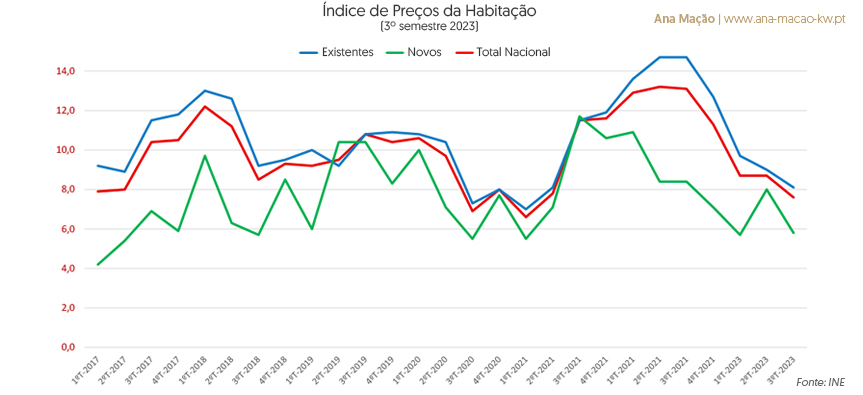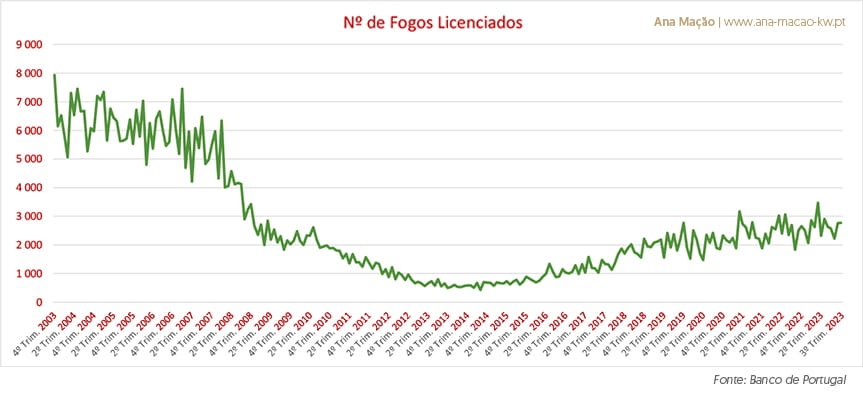I finished 2023 well, 2024 belongs to God
Currently, we face a new difficulty: the scarcity of available properties. This phenomenon, combined with rising prices, is making access to housing increasingly complicated for the majority of Portuguese people. However, despite all these challenges, 2023 turned out to be the most fruitful year of my career as a real estate consultant. The numbers speak for themselves!
However, as in previous years, the market brought new particularities. In 2023, I noticed a decrease in transactions with Portuguese customers, who generally belong to the upper-middle class, in favor of an increase in foreign and Portuguese customers residing abroad. Compared to 2022, the average value per transaction has risen, both due to the continued increase in housing prices and the sale of more luxury properties. I anticipate that this trend will continue into 2024.
I completed fewer transactions than in 2022 - a total of 50 - but these represented a higher business value than the previous year:
The total value of properties transacted by me amounted to an impressive 33 million euros!
In other words, according to KW Portugal, in 2023 I will receive the Triple Platinum distinction, as in 2022, an unprecedented level in Portugal for the approximately 3000 consultants who work for the largest franchising brand in the world: Keller Williams. It may be in 2024 that it finally reaches the Quadruple Platinum level. It's good to have goals!

Here is my thanks to all the customers who contributed to this achievement, the brand (KW Portugal), the Market Center (KW Sol) and all colleagues in the real estate sector.
The economy as the balance
2023 is having a strongly negative impact due to inflation - which affects the cost of materials and labor - and restrictions on access to housing credit. 2024 is expected to continue this trend.
- Inflation: Despite being slowing down, with rates expected to be below or equal to 2% across Europe for the 2nd half of 2024, the potential increase in labor costs cannot be ignored, especially in the construction and rehabilitation of properties. This situation is due to the scarcity of human resources and, more specifically, the lack of specialized professionals. In short, inflation will maintain, in 2024, its negative impact on the formation of prices for renovated or new construction homes.
- Housing Credit: In 2023, we will see a notable reduction in loans granted by national banks.This phenomenon was largely due to the increase in interest rates for credit, which practically doubled. On the other hand, the most recent data reflects the beginning of the reduction in Euribor rates, which are expected to have already reached their peak. It is estimated that rates will begin to fall from the 2nd quarter of 2024, and could reach 2.5% by the end of 2024. At the same time, the conditions for obtaining a loan have become more restrictive, with banks require a lower rate of effort from those requesting a loan.
- Economic Recession: The combination of the above factors is negatively impacting the economy, with rising unemployment rates and the slowdown in economic growth generating concerns across Europe. The real estate sector, which is generally affected by recessionary periods, tends to feel these impacts with some delay. Therefore, the continuation of the current recessive climate in the real estate sector is expected for the 1st half of 2024.
This analysis reflects a challenging reality in the real estate sector, where the need for adaptation and resilience in the face of constantly evolving economic conditions is expected.

Therefore, economic dynamics will play a crucial role in the real estate market in Portugal during the year 2024. The speed with which inflation and interest rates normalize, together with the pace of economic growth, will determine how quickly the real estate sector will be able to recover .
Digitization and Technological Innovation
Technology is playing an increasingly prominent role in people's lives and in the way they relate to the real estate market. In 2024, an even greater integration of digital solutions, such as virtual tours, artificial intelligence and online platforms, is expected, providing a more effective and personalized experience for both buyers and sellers.
On the other hand, the trend of Artificial Intelligence (AI) in the real estate sector in 2024 points to a significant increase in its adoption and impact.

Artificial Intelligence (AI) is becoming an increasingly essential tool in the real estate sector, evolving at a surprising pace. It's no longer just about using tools like ChatGPT or Google Bard; AI is expanding, subtly, throughout the digital universe, in several ways:
- Advanced Data Analysis: AI enables a more detailed and accurate analysis of market data, contributing to predicting trends, assessing the value of properties and identifying investment opportunities. Real estate investors and consultants from around the world are already using AI to predict and analyze risks.
- Customer Experience Personalization: AI can be employed to offer personalized recommendations to buyers and investors based on their preferences and search history. This approach improves the user experience. Real estate advertising platforms already integrate AI, making it easier to search for properties, create descriptions, etc. Although it is interesting that AI can suggest suitable properties, there is a risk of hiding other potentially surprising and attractive options for the buyer. Despite its capabilities, AI still cannot match human empathy.
- Process Automation: AI is capable of automating repetitive and routine tasks, such as preparing reports, managing documents and responding to frequently asked questions, optimizing operational efficiency. Many real estate consultants and administrative teams use tools such as ChatGPT and Bard almost daily to boost their productivity.
- Price Estimation: AI can help set more accurate and competitive sales or rental prices by analyzing large amounts of market data and adapting to market fluctuations in real time.
- Integration with Other Technologies: AI is in the process of integrating with other technologies, such as the Internet of Things (IoT), aiming to improve the management of buildings and infrastructures.
Thus, AI is transforming the way the real estate sector operates, bringing innovation and efficiency to several areas, which will become impactful over the coming years.
Construction and Real Estate Mediation

Since 2019, with each passing year, new challenges arise for the Portuguese real estate industry. Currently, difficulties in accessing housing credit, along with the scarcity of new construction, represent one of the main obstacles.
Real Estate Mediation
Although the real estate sector faces challenges, we cannot ignore that they also bring their advantages, such as encouraging greater professionalism in the field. Strict supervision in areas such as combating money laundering and the need to report to the Bank of Portugal are clear examples of this, while the regulation of the real estate consultant profession is still awaiting definition. The recent fall of the Government has delayed this process, which has been in the preparation phase for approximately a year.
In the second half of 2023, we observed a notable decrease in the number of real estate transactions, also reflecting the reduction in housing loans granted. However, the luxury segment, aimed at foreigners and Portuguese expatriates, has helped to somewhat mitigate this impact.
- Transactions in 2023: in the 3rd quarter, we saw a growth of +7.6% in the House Price Index (HPI) in annual terms, although there was a slight drop of -1.1% compared to the previous quarter.
- Commercial market: the first half of 2023 closed with a total investment of 765 million euros, marking an 8% decrease compared to last year.
- Price evolution: despite the decrease in transactions, values continued to rise, albeit at a more moderate pace. According to INE data, in the 3rd quarter of 2023, the increase in prices in used homes was +8.1%, surpassing that of new homes, which registered +5.8%. There is, therefore, a more pronounced growth in the prices of existing housing compared to new ones, but a slowdown in this growth has been noticeable since the 4th quarter of2021.

In 2024, real estate mediation professionals will continue to face challenges that have already existed in 2023, such as high prices, a shortage of properties and difficulties in accessing housing credit. There is uncertainty about whether this year will bring improvements compared to the previous one. The economic recession, already noticeable in some European countries, suggests that the situation could deteriorate before a recovery is seen . Therefore, it is essential that real estate agents maintain their spirits and redouble their efforts in raising and diversifying their property portfolio.
The dynamics of the real estate market are influenced by several economic variables. For 2024, current trends are expected to continue, with a possible reversal in the second quarter, driven by the fall in Euribor rates , a potential new government approach , the impact of measures from the licensing simplification package ( Simplex dos Licenciamentos) and the stabilization of inflation.
However, the factor that has most influenced the national real estate market, and which presents some uncertainty, is the behavior of foreign buyers. On the one hand, the sustained growth of tourism suggests a positive trend, particularly in the North American market - on the rise due to the intense promotion of Portugal - and in the Brazilian and Spanish markets, affected by new tax measures. On the other hand, global economic uncertainty and restrictive policies implemented in 2023 could result in negative impacts, especially on the part of International Funds.
Construction
In 2024, the real estate sector faces two main challenges: distrust among investors, both national and international, and delays in the approval of licenses by municipal councils.
The significant reduction in investment in the third quarter of 2023, which fell to almost half the value recorded in the previous year , clearly reflects the growing distrust of investors. This scenario was worsened by the Mais Habitação Program. The measures that disfavored Local Rental, the end of the Visa Gold programs and the Non-Habitual Resident Status (RNH), combined with restrictions and freezing in the rental market, have contributed to this unfavorable environment. Inflation and high interest rates make the situation even worse.
On the other hand, we face bureaucracy and slowness in urban planning services at municipal councils. These factors have been an obstacle to granting licenses for the construction of new homes in Portugal. These delays directly affect the supply of new properties on the market, contributing to rising prices and exacerbating the housing crisis in the country.
According to data from the Bank of Portugal , there was a sharp drop in the licensing of new homes, a phenomenon that dates back to the 2008 financial crisis. After this drop, the recovery that began in 2016 has been moderate and has stabilized over the last three years.

On the other hand, there is considerable optimism regarding the new licensing simplification program, the Simplex do Licenciamento Urbanístico , recently published in Dário da República. This program aims to simplify the licensing process, removing licenses (Use License), authorizations and procedures that are considered unnecessary or duplicated in the areas of urban planning, spatial planning and industry.
One of the key initiatives of this decree is the change in the licensing process for architectural projects. It is proposed that these projects be licensed only based on the designers' liability agreement. This change promises to make the process much faster, although it is raising concerns and opposition from the Order of Architects. The new diploma, which will be implemented during 2024, has great potential to benefit the real estate and construction sector. It can speed up the approval of new housing projects, helping to mitigate supply and cost issues in the housing market.
Emerging Markets

In addition to large urban centers, emerging real estate markets are gaining strength. These regions offer interesting investment opportunities, with potential for appreciation in the medium and long term.
The constant influx of new buyers from around the world is changing the real estate landscape. Due to the rise in prices in the main metropolitan areas, both for the sale and rental of properties, the interior regions of the country and the less developed coastal areas are receiving special attention from real estate developers, mediation agencies and buyers. Among the emerging markets, the following stand out:
Madeira and Azores: The island regions of Portugal have distinct dynamics. Madeira Island, especially since the pandemic, has gained international prominence, attracting promoters from different origins, including from the continent and other countries. We have seen a significant increase in investment by foreign buyers, transforming Madeira into one of the main real estate destinations in Portugal. This growth is due, in part, to the support and agility that the regional government and municipal councils have shown in relation to new construction projects, which contrasts with the situation on the mainland. It is expected that in 2024 competition between players in the real estate market in the region will increase even further, attracting even more professionals to this island.
As for the Azores Region, a similar process is beginning, although with some delay. Tourism has been one of the main drivers of growth in the real estate sector, and the Azores are no exception.The region has been catching up in terms of tourism development, when compared to Madeira, and is showing signs of significant growth.
Interior of Portugal: It is in the interior of the country that we find properties with more affordable prices and more affordable land. From north to south, outside traditional urban areas, 2024 will witness an increase in new projects across a range of sectors, including tourism, the luxury segment, senior housing and conventional residential properties.
Algarve: One of the main challenges for the healthy growth of the residential and tourist market in the Algarve has been the slowness and bureaucracy in many municipalities in the region. However, something is changing. New projects are emerging in places such as Tavira, Olhão, Vila Real de Santo António and others.
Coast of Portugal: New trends are emerging. The increase in prices is taking buyers to coastal regions a little away from the main cities, from Comporta to Melides, from Tavira to Vila Real de Santo António, from Ericeira to Caldas da Rainha, among others.
This trend can be explained by several reasons, including the search for more affordable homes, the search for a better quality of life and the interest in areas with lower population density. Furthermore, the country's less explored areas offer unique opportunities for both residential and tourism investments, attracting a variety of investors and buyers. This trend also reflects changes in consumer preferences, who increasingly value sustainability, tranquility and connection with nature, aspects often found in areas outside large urban centers.
The revitalization of less dynamic areas, through real estate investment, can result in improvements in local infrastructure, increased employment and growth in the service and commerce sector.
Sustainability and Energy Efficiency
Growing environmental awareness is having a significant impact on purchasing and investment decisions in the real estate sector. As we move towards 2024, the increase in buyer preference for sustainable and energy-efficient properties is notable. This covers projects that adopt environmentally friendly materials, focus on energy efficiency and incorporate ecological solutions.
It is also expected that real estate developments in 2024 will be characterized by the integration of smart technologies and the offer of efficient energy solutions, which, in turn, promotes the well-being of residents. This trend reflects not only concern for the environment, but also the desire to create modern and comfortable living spaces.
Therefore, the future of the real estate market appears to be aligned with more sustainable and well-being-oriented practices, which benefits both buyers and our planet.
Innovation in Design and Functional Spaces
As demand for housing continues to evolve, consumers are showing a growing interest in innovative environments and functional spaces. Nowadays, properties that offer flexibility and mobility are being increasingly valued. This trend is driven by changes in space and location needs that have emerged following the pandemic.
These changes reflect an era of rapid transformation in the real estate market in Portugal, with a strong focus on innovation, sustainability and technology. Furthermore, the market will have to face the challenges that arise in the current economic context. For professionals in the sector, such as property consultants, it is essential to stay up to date with these trends. This involves adopting modern technologies, seeking information about sustainable practices and exploring new markets and opportunities.
In this dynamic scenario, adaptation and the constant search for knowledge are keys to success in today's real estate market.



